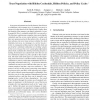Free Online Productivity Tools
i2Speak
i2Symbol
i2OCR
iTex2Img
iWeb2Print
iWeb2Shot
i2Type
iPdf2Split
iPdf2Merge
i2Bopomofo
i2Arabic
i2Style
i2Image
i2PDF
iLatex2Rtf
Sci2ools
117
click to vote
NDSS
2006
IEEE
2006
IEEE
Trust Negotiation with Hidden Credentials, Hidden Policies, and Policy Cycles
In an open environment such as the Internet, the decision to collaborate with a stranger (e.g., by granting access to a resource) is often based on the characteristics (rather than the identity) of the requester, via digital credentials: Access is granted if Alice’s credentials satisfy Bob’s access policy. The literature contains many examples where protecting the credentials and the access control policies is useful, and there are numerous protocols that achieve this. In many of these schemes, the server does not learn whether the client obtained access (e.g., to a message, or a service via an eticket). A consequence of this property is that the client can use all of her credentials without fear of “probing” attacks by the server, because the server cannot glean information about which credentials the client has (when this property is lacking, the literature uses a framework where the very use of a credential is subject to a policy specific to that credential). The main resu...
| Added | 12 Jun 2010 |
| Updated | 12 Jun 2010 |
| Type | Conference |
| Year | 2006 |
| Where | NDSS |
| Authors | Keith B. Frikken, Jiangtao Li, Mikhail J. Atallah |
Comments (0)

